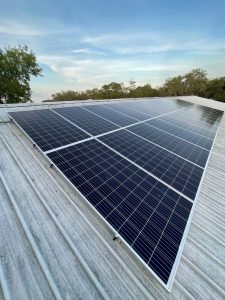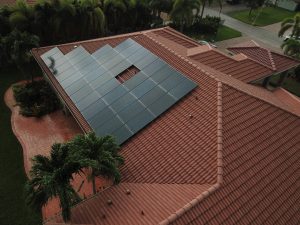 Did you know that Florida ranks 3rd in the United States for solar potential, but only 14th in terms of rooftop solar installed? This is because, although there is a lot of potential for solar, there aren’t quite enough incentives (yet) in the state of Florida to motivate homeowners to make the transition compared to other states. Although the cost of solar in Florida has declined notably over the last decade, it is still a significant investment for home and business owners looking to lower their electricity bills. Hence, a good set of incentives that can appeal to more homeowners would most definitely stimulate this transition. So, let’s look at what incentives the state of Florida offers compared to other states such as Massachusetts.
Did you know that Florida ranks 3rd in the United States for solar potential, but only 14th in terms of rooftop solar installed? This is because, although there is a lot of potential for solar, there aren’t quite enough incentives (yet) in the state of Florida to motivate homeowners to make the transition compared to other states. Although the cost of solar in Florida has declined notably over the last decade, it is still a significant investment for home and business owners looking to lower their electricity bills. Hence, a good set of incentives that can appeal to more homeowners would most definitely stimulate this transition. So, let’s look at what incentives the state of Florida offers compared to other states such as Massachusetts.
When you go solar in Florida, you may qualify for a few state and federal incentives to help you save more money. Let’s begin with the most popular state incentive offered known as net energy metering (NEM). Thanks to Duke Energy, Florida Power & Light (FPL), Tampa Electric Company (TECO), and other utility companies’ NEM programs, residential and commercial customers get the opportunity to get paid for the energy they generate with their solar panel systems, where they earn bill credits for the excess solar power they create. Those customers push the electricity they aren’t using back onto the grid and receive a credit from their utility. They are only billed for the “net” energy used each month. Net metering policies allow distributed generation customers to sell excess electricity to a utility at a retail rate and receive credit on their utility bill. This credit offsets the customer’s electricity consumption during other times of the day or year, which reduces the amount of electricity the customer purchases from a utility. Another attractive incentive in the state of Florida is the Solar System Property Tax Exemption. Although going solar increases your home’s value up to 4%, with this exemption, your property taxes won’t go up after adding a solar panel system to your home. The final state incentive offered in Florida is the Home Solar System Sales Tax Exemption, which allows residential homeowners to not have to pay any sales tax on the cost of their system, saving homeowners 7% right off the bat.
As far as federal incentives go, Floridians can also take advantage of the Federal Solar Investment Tax Credit (ITC). Residential and commercial properties are eligible for this incentive although the percentage does vary between the two. For residential, any homeowner that installs solar panels on their home can qualify for a 26% tax credit the year following the installation. However, this incentive drops down to 22% in 2023 and ends in 2024.
Nonetheless, the incentives in Florida are a great reason to go solar and save even more money on your electric bills. But you would think that with 230 days of sunshine, Florida would be booming in terms of rooftop solar installations, right? So, what is Florida lacking to motivate more homeowners to make the switch? Let’s look at the state of Massachusetts and the incentives they offer for going solar.
Massachusetts vs. Florida
 On average Massachusetts counts on only 197 days of sunshine per year, yet they are ranking in 8th place in the top ten states for solar. Why? Because in addition to the current ITC, Massachusetts offers five additional state incentives for going solar, five! They offer an additional 15% state solar tax credit for residential solar panel systems purchased known as the Residential Renewable Energy Income Tax Credit. So added with the 26% ITC, that’s a 41% tax credit to those eligible. That is almost a 50% credit of the entire system cost! Then we have the Solar Massachusetts Renewable Target Program (SMART) which provides compensation for each kilowatt per hour produced by the system. This is followed by the Solar Installation Property Tax Exemption which is the same as in Florida where property taxes will not go up with the purchase of a solar panel system. Massachusetts also offers the Home Solar Project Sales Tax Exemption which save residents a 6.25% sales tax on the purchase of a solar panel system which is applicable on 100% of the sales tax. Lastly, Massachusetts offers the Mass Solar Loan Program which allows qualified low-income homeowners to get access to a low-interest loan to install residential solar panels.
On average Massachusetts counts on only 197 days of sunshine per year, yet they are ranking in 8th place in the top ten states for solar. Why? Because in addition to the current ITC, Massachusetts offers five additional state incentives for going solar, five! They offer an additional 15% state solar tax credit for residential solar panel systems purchased known as the Residential Renewable Energy Income Tax Credit. So added with the 26% ITC, that’s a 41% tax credit to those eligible. That is almost a 50% credit of the entire system cost! Then we have the Solar Massachusetts Renewable Target Program (SMART) which provides compensation for each kilowatt per hour produced by the system. This is followed by the Solar Installation Property Tax Exemption which is the same as in Florida where property taxes will not go up with the purchase of a solar panel system. Massachusetts also offers the Home Solar Project Sales Tax Exemption which save residents a 6.25% sales tax on the purchase of a solar panel system which is applicable on 100% of the sales tax. Lastly, Massachusetts offers the Mass Solar Loan Program which allows qualified low-income homeowners to get access to a low-interest loan to install residential solar panels.
It is evident that the more money people save going solar, the more likely they are to make the switch. And that is exactly what Florida needs to do. Provide more monetary incentives to homeowners to make going solar that much more affordable. We only mentioned the state of Massachusetts, but Florida can follow in the footsteps of many other states such as Rhode Island who offers homeowners a rebate of $0.85 per watt when they purchase a new solar panel system. Another great program Florida should offer is something similar to Connecticut’s Energy Conservation Loan Program which provides homeowners loan options with as little as 0% interest to finance their solar projects. It is in the hands of the federal government, state, and local governments, and even utility companies to offer more incentives to help make solar more affordable and accessible to everyone, igniting the greater adoption of solar energy now and the years to come.


